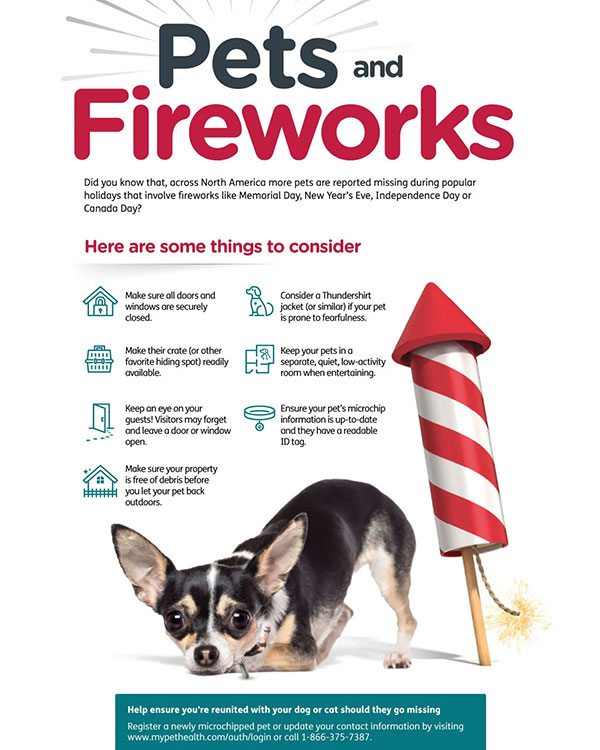Fireworks, picnics and other Fourth of July traditions can be great fun for people; but all of the festivities can be frightening and even dangerous for animals. Noisy fireworks and other celebrations can startle animals and cause them to run away; holiday foods can be unhealthy; summer heat and travel can be dangerous; and potentially dangerous debris can end up lying on the ground where pets can eat or play with it.
The AVMA offers tips to keep your pet safe during the holiday weekend.
1. Leave your pets at home when you go to parties, fireworks displays, parades and other gatherings. Loud fireworks, unfamiliar places and crowds can all be very frightening to pets, and there’s great risk of pets becoming spooked and running away.
2. Consider putting your pets in a safe, escape-proof room or crate during parties and fireworks.
3. If you’re hosting guests, ask them to help keep an eye on your pets to make sure they don’t escape. Placing notes on exit doors and gates can help both you and your guests remain vigilant.
4. Keep your pets inside if you or your neighbors are setting off fireworks.
5. Keep sparklers, glow sticks, fireworks, charcoal and kabob skewers away from curious pets.
6. Don’t let pets get near your barbecue grill while it is in use or still hot.
7. Avoid the urge to feed your pets table scraps or other foods intended for people. Be especially careful to keep them away from these common foods that are actually toxic.
8. Remember that too much sun and heat (and humidity!) can be dangerous to pets. Keep them inside when it’s extremely hot/humid; make sure they have access to shady spots and plenty of water when outdoors; don’t leave them outside for extended periods in hot weather; and know the signs that a pet may be overheating.
9. Never leave your pet in your car when it’s warm outside. Vehicle interiors heat up much faster than the air around them, and even a short time in a locked car can be dangerous to pets.
10. If you’re travelling out of town for the holiday, consider leaving your pets at home with a pet sitter or boarding them in a kennel. If you need to bring them with you, be sure you know how to keep them safe.
11. Follow safe food handling and hygiene practices to protect your family and guests.
Read more from AVMA


